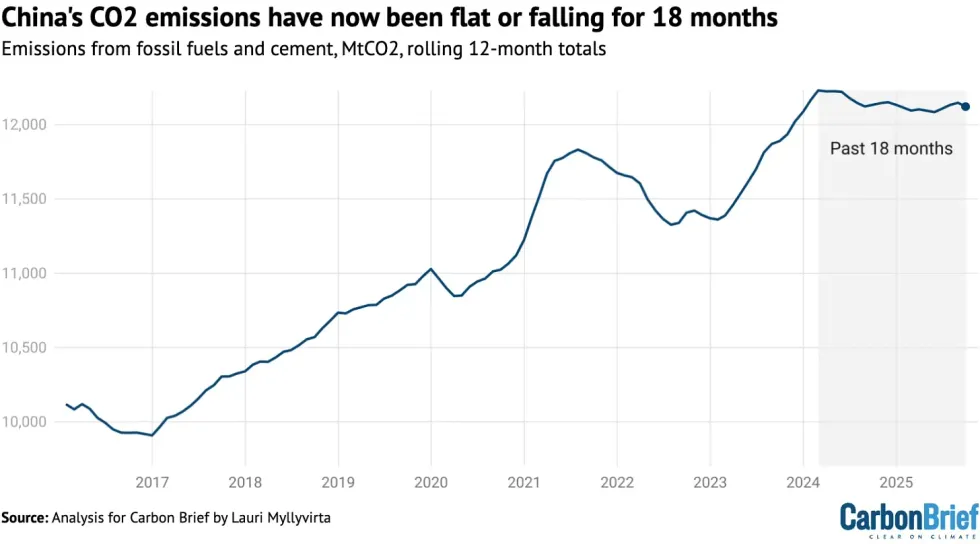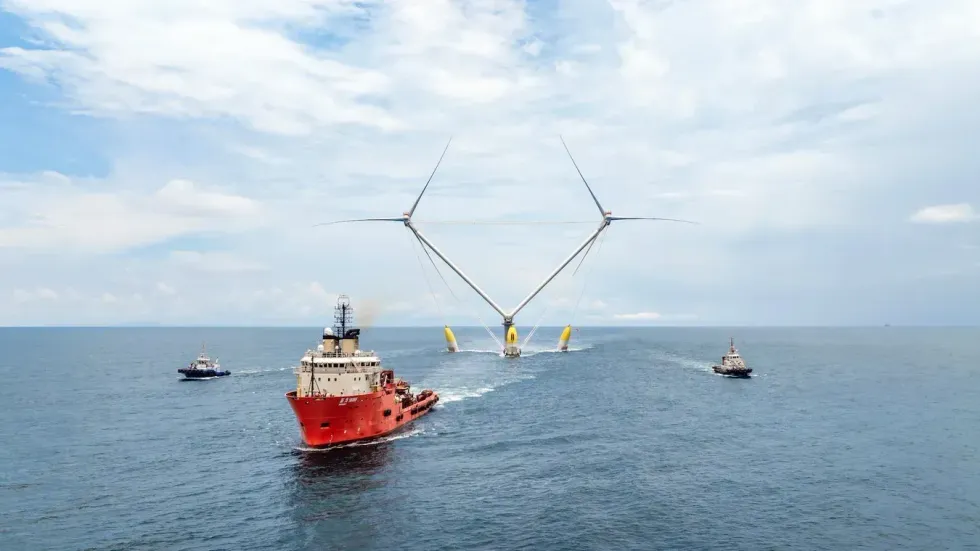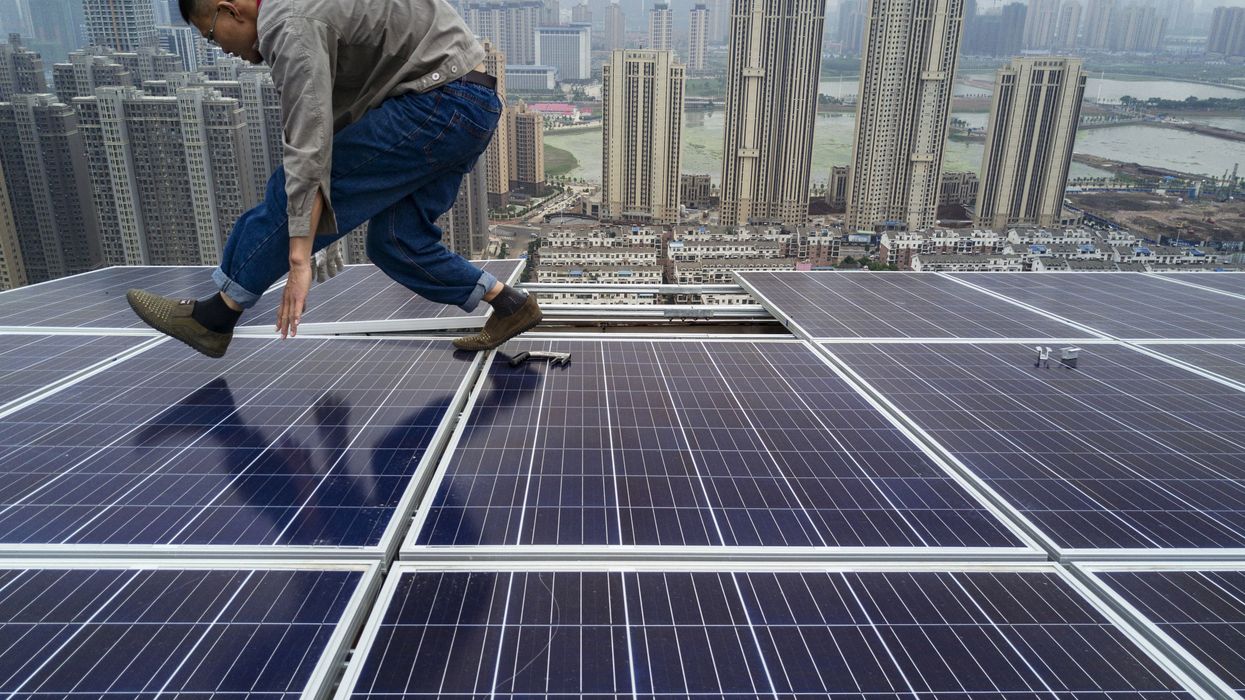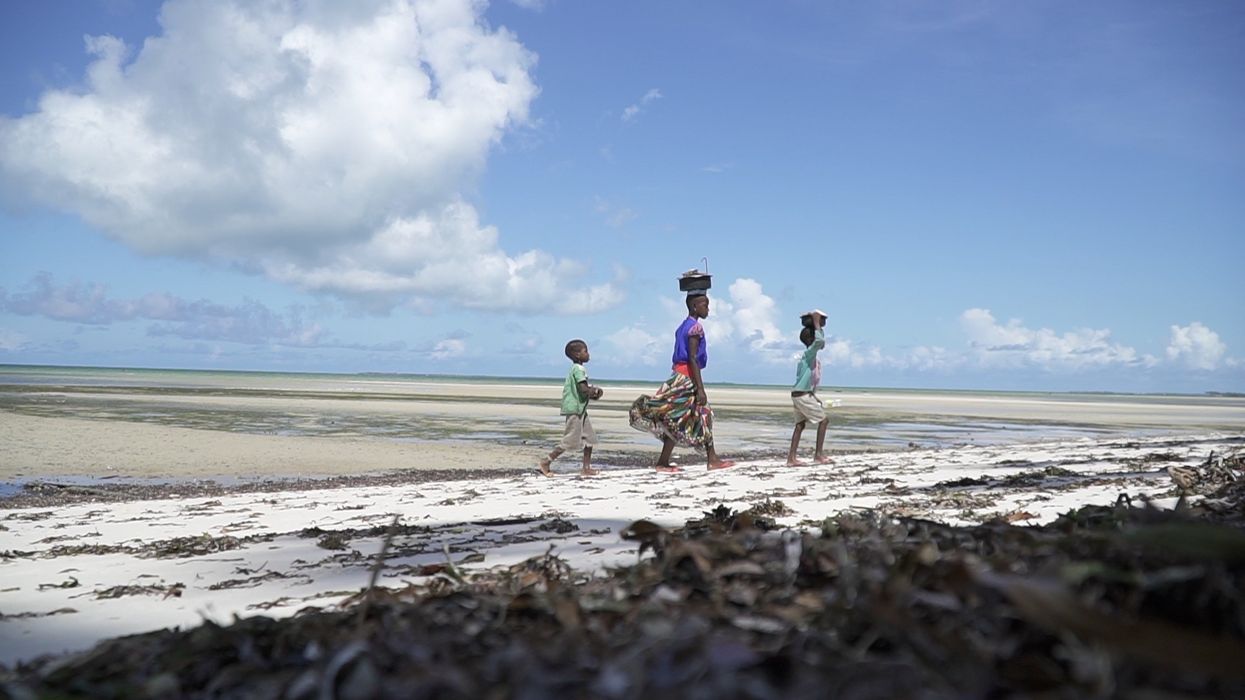There's Nothing Fair About It, But the Global South Is Leading the Way on Climate
The rich world—represented mostly by the US, though with parts of Europe and Canada playing supporting roles—has decided that if anyone’s going to deal with climate change it’s not going to be us.
In a rational world, it would have made sense for the rich countries to take the lead in fighting climate change. After all, it was rich countries got that way precisely by burning fossil fuel in the two centuries since the Industrial Revolution, and it’s the Global South that is paying most of the price in terms of drought, flood, and fire.
That’s why, since the international climate negotiations began 30 years ago, the assumption has been that the Global North should lead the way—we had “common but differentiated responsibilities” for the future, and the job of the north was to help finance the transition away from dirty energy.

But as this year’s round of global climate talks get underway in Belém, it’s becoming clear that this commonsensical (and moral) understanding of the situation has been essentially turned on its head. If there’s going to be a solution, for now it’s mostly going to come from the poorer nations of the world. The chart above shows China—it’s emissions of carbon dioxide have apparently now peaked, or at least plateaued. It should come as no great wonder to readers of this newsletter why: Their barely believable expansion of clean carbon-free energy has been the most important technological story since… the Industrial Revolution. And it shows no signs of stopping. Here, for example, is a picture of a new offshore wind turbine that the Chinese are testing.

You might notice that it has two heads instead of one. As You Ziaojing reports in Scientific American:
With a capacity of 50 MW, this supersized structure is designed to float on the ocean’s surface and can withstand typhoons, according to the company, which plans to start making the turbine later this year and to deploy it next year.
Han Yujia, a researcher of renewable energy at the California-based nonprofit Global Energy Monitor, is most impressed that Ming Yang intends to increase a turbine’s capacity by more than 20 MW in one go, far outpacing the industry’s average rate of increase of 2-3 MW each year.
If you want to read more about the spectacular events in China, the Economist has a special issue on the subject—the key articles are here, here, and here, and just to give you a sense of what’s happening there:
The scale of the renewables revolution in China is almost too vast for the human mind to grasp. By the end of last year, the country had installed 887 gigawatts of solar-power capacity—close to double Europe’s and America’s combined total. The 22m tonnes of steel used to build new wind turbines and solar panels in 2024 would have been enough to build a Golden Gate Bridge on every working day of every week that year. China generated 1,826 terawatt-hours of wind and solar electricity in 2024, five times more than the energy contained in all 600 of its nuclear weapons.
In the context of the cold war, the distinctive measure of a “superpower” was the combination of a continental span and a world-threatening nuclear arsenal. The coming-together of China’s enormous manufacturing capacity and its ravenous appetite for copious, cheap, domestically produced electricity deserves to be seen in a similar world-changing light. They have made China a new type of superpower: One which deploys clean electricity on a planetary scale.
But this miracle is verging on "old news—I’ve been telling the tale since my book came out earlier this year, always to somewhat amazed audiences.
The next half of the story is what’s unfolding around the rest of the developing world, as countries increasingly look to China, not the US, for leadership. Here’s what André Corrěa de Lago, the Brazilian diplomat chairing the COP30 conference, told reporters earlier this week:
“China is coming up with solutions that are for everyone, not just China,” he said. “Solar panels are cheaper, they’re so competitive [compared with fossil fuel energy] that they are everywhere now. If you’re thinking of climate change, this is good.”
You can see this showing up in many ways around the world. In Pakistan, for instance:
Between 2022 and 2024 trade statistics show Pakistan’s annual imports of Chinese-made solar panels increasing almost fivefold to 16 gigawatts. In the first nine months of 2025 it imported another 16GW. By the end of this year, its cumulative solar imports are expected roughly to match the installed generation capacity of the national power system—capacity augmented quite recently by four spanking new coal-fired plants built and financed by China as part of its global Belt and Road infrastructure scheme.
Since 2022 the power providers responsible for that legacy capacity have seen their revenues plummet. Power consumption from the grid has dropped by around 12%. With new solar users increasingly likely to install Chinese-made batteries that allow them to enjoy access to electricity after sunset, that fall looks likely to continue.
Never to be outdone by Pakistan, word comes from India that giant conglomerate Tata—biggest provider of everything from defense equipment to tea—is now building the country’s biggest factory for making the polysilicon ingots that are the foundation of solar cells. As N.R. Sethuraman reports:
Some Indian companies have shifted focus to producing cells as well as ingots and wafers, as higher US tariffs on Indian products have made solar module exports less attractive.
“We find that there’s already adequate capacity of modules and many cell plants are under construction in India,” Sinha said on a post-earnings call, justifying his firm’s plan to set up a wafers and ingots factory.
So far, Adani Group has set up a plant to produce 2 GW of ingots and wafers annually.
Tata Power’s plans align with the Indian federal government’s push for increased use of locally made ingots and wafers for solar panel manufacturing to cut reliance on imports from China towards the end of the decade.
But it’s not just at the high end of the business world. Consider Yamuna Mathewsaran’s report on how Jordanian mechanics are building a big business out of recycling EV batteries to backup home solar systems:
EV batteries that are classed as end-of-life may still retain up to 80% of their original capacity, according to the International Energy Agency, which means they can still be used in second-life applications, such as household energy storage.
“I’ve seen and heard of spent batteries being hooked up to solar systems or other local power setups, often at family farms or vacation homes in semi-remote areas,” said Fadwa Dababneh, C-Hub’s director.
As well as saving money on bills and reducing battery waste, using spent batteries for energy storage stabilises the electricity grid as Jordan aims to get half of its power from renewables by 2030, up from 29% today.
This, of course, is in dire contrast to the abdication of responsibility underway in the West, especially in the US. I’m not going to go into more bloody detail than is necessary, but:
- New data shows America’s carbon emissions are now rising (again, the opposite of China’s decline. This is the disgusting result of Trumpian energy priorities
- Moving beyond carbon, new data shows America’s methane emissions are skyrocketing. As Fiona Harvey reports:
At COP26 in Glasgow in 2021, the UK, the US, the EU and other countries forged the global methane pledge, requiring a cut in methane of 30% by 2030. About 159 countries subsequently signed up.
Yet emissions from some of the main signatories have increased, data from the satellite analysis company Kayrros shows, which is likely to further raise global temperatures. Collectively, emissions from six of the biggest signatories—the US, Australia, Kuwait, Turkmenistan, Uzbekistan and Iraq—are now 8.5% above the 2020 level.
Kuwait and Australia have made progress on cutting their emissions but emissions from US oil and gas operations have increased by 18%.
Again, this is disgusting, and it will get worse. Under fracking exec energy secretary Christopher Wright, America is rolling back its modest methane reporting requirements
- TrumpNASA is busily shutting down its space science lab, and TrumpNOAA is, almost inconceivably, trying to shut down the carbon dioxide monitoring station on Mauna Loa (aka the most important scientific instrument in world history) as well as the three other such stations we maintain around the world. (The Trump administration is literally trashing the scientific equipment needed for this work).
- TrumpDOE and TrumpInterior are doing their damnedest to shut down America’s entire energy transition. The Solar Energy Industries Association reports that 500 projects representing 116 gigawatts worth of power are now endangered. This represents half of all the proposed power projects in America. No wonder that the not-very-radical analysts at Sky News project that America will soon have “a real energy emergency”:
US consumers—who Mr Trump promised lower bills—will end up paying more because he also made renewable energy more expensive.
And that’s to say nothing of the impact on carbon emissions.
This “greenlash” has extended to other parts of the Western world—as the always sage activist and analyst Luisa Neubauer writes from Germany:
When searching for explanations for the paradoxical decrease in governments’ efforts at a time when climate threats are dramatically increasing, many land on three forces: public fatigue, financial constraints, and geopolitical instability. All three are real.
But none, as she points out, are good reasons for slowing down, and indeed:
Decarbonising economies that have throughout their existence depended on fossil fuels is complicated, and will only become more so. But there is no more important task for governments than finding ways through these challenges and forging alliances of the willing to protect life. If common politics doesn’t grow a spine, then public commentators must—for the sake of, well, everything.
In fact, a new report from the think tank Ember makes clear that Europe will benefit immensely from quick electrification. And indeed, there are signs that Europe will still push ahead. They’re coming, interestingly, from the central European countries long considered the continent’s coal belt. As Gavin Maguire writes:
Power systems across Central Europe—hardly known for its sunny skies—are emerging as surprise leaders in global energy transition efforts through canny use of solar parks and locally-made battery energy storage systems.
Several major Central European economies—including Austria, Hungary, Romania, and Poland—have sharply boosted the share of utility electricity production from solar farms since 2022 as part of efforts to boost home-grown energy supplies.
Between 2022 and 2025 there has been a 472% rise in battery energy storage capacity within Austria, Hungary, and Romania alone, according to local utility filings.
Even in America there are signs of life. Some of these are built on sheer momentum: Texas, for instance, just signed up two huge new solar farms, which together will deliver a gigawatt of power. But there are also signs of spirited resistance. California Gov. Gavin Newsom went to Belém representing the world’s fourth largest economy, and he said Trump was “doubling down on stupid” when it came to climate. Illinois Gov. JB Pritzker keeps winning high marks for his climate policy too, and shows no sign of slowing down.
But as Wen Stephenson points out in a new essay in The Nation, overall it’s been the worst year ever for American climate politics, with many theoretically environmentally conscious politicians retreating under the cover provided by the likes of Bill Gates. In Stephenson’s Massachusetts, for example, despite the noble leadership of Boston Mayor Michelle Wu and Sen. Ed Markey, and the behind-the-scenes steadfastness of Gov. Maura Healey’s crack climate team, the state legislature is considering cutting and running. Rep. Mark Cusack is pushing hard for a bill to weaken the state’s climate goals, in essence arguing that Trump is making it too hard. In essence, the state’s plan to cut emissions in half would become “advisory and unenforceable.” Meanwhile, in New York, the increasingly egregious Gov. Kathy Hochul (named to Time’s Climate 100 list despite an almost year-long blockage of congestion pricing laws) has not only come out for a new gas pipeline backed by Trump, but also, to use the headline supplied by Politico, “approved a permit for a gas-fired cryptocurrency miner.” Now there’s leadership for the ages!
What it all adds up to is that the rich world—represented mostly by the US, though with parts of Europe and Canada playing supporting roles—has decided that if anyone’s going to deal with climate change it’s not going to be us. We got so rich burning fossil fuels that any sacrifice—or any change at all, since at this point sun and wind are the cheapest forms of power we know—seems like an impossible affront. Some of us will keep working hard to change that immorality, but in the meantime it’s apparently up to the poorest people on Earth to deal with the problems we caused. As Somini Sengupta and Brad Plumer report from Belém:
Countries like Brazil, India, and Vietnam are rapidly expanding solar and wind power. Poorer countries like Ethiopia and Nepal are leapfrogging over gasoline-burning cars to battery-powered ones. Nigeria, a petrostate, plans to build its first solar-panel manufacturing plant. Morocco is creating a battery hub to supply European automakers. Santiago, the capital of Chile, has electrified more than half of its bus fleet in recent years.
Nothing fair about it, but the only consolation for those countries is that they’re building low-cost energy economies that before long will outcompete lazy and complacent America.


